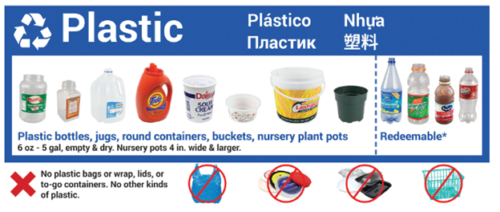By Jim Newcomer, LOSN Materials Management Team
Amanda Watson manages the city’s sustainability program, and that includes managing responsibly the waste the city and its people generate. To get answers to some of the recycling questions we all face weekly, we sent her a couple of questions, and she provided answers that we can all use.
For citizens who mean well and intend to recycle as much as we can, it can be daunting to remember exactly what is recyclable. And when we look at a plastic object, we may want to recycle it even though the chart on the refrigerator doesn’t mention it.
To find out, many people call Amanda.
Answering those calls is not a simple job.
I was curious about what people want to know from the city coordinator who supervises all the collection choices. I asked her in advance of sitting down in person: what are the most frequently asked questions about recycling?
She wrote back:
What do I do with….?
Many of the questions I get about recycling and disposal are from people wanting to know how to responsibly get rid of more unusual or infrequently disposed of household items, everything from fluorescent light tubes to large amounts of cardboard to old office supplies.
People are always welcome to call me with questions, but the best first place to look would be Metro’s online Find A Recycler website. Just put in your address and what you are looking to dispose of, and you will get a list of locations sorted by distance to you for reuse, recycling, and/or disposal of those items. Metro also has a fully-staffed recycling hotline that people can call with questions: 503-234-3000.
Questions about recycling plastic
In the Metro region, whether or not plastic is recyclable depends on the shape and size of the item, not on the recycling symbol or number it may be labeled with. All plastic bottles, jugs, round containers and buckets between 6 oz – 5 gallons, and nursery plant containers 4 in wide and larger are recyclable. Caps and lids must be removed and put in the trash as they are too small to be sorted by the recycling machines.
This means that things like square plastic containers for berries and salad greens (“clamshells”) are not recyclable curbside. These need to go in the garbage, or they can be disposed of at New Seasons stores.
Unfortunately we do see people putting non-recyclable types of plastic into their curbside recycling bins hoping they are recyclable. While I understand the wish that more materials could get recycled, this “wishcycling” creates contamination which is costly for recycling facilities to sort out.

What do I do with old batteries?
As of 2023, residents of single-family homes in Clackamas County can recycle batteries curbside. Follow the preparation instructions in the graphic below.

Batteries are considered hazardous waste, and pose safety issues when they are improperly disposed of. If you don’t live in a single-family home, you will need to take your used batteries to the Metro south hazardous waste facility (disposal is free for household amounts) or a retail business in the area that accepts batteries for recycling (check Find a Recycler!).
When we met in person, she shared that we can expect some major changes in the coming year. In 2021 the Oregon Legislature passed the Plastic Pollution and Recycling Modernization Act, which is designed to ensure that plastics get recycled and that the companies that produce them pay to make it happen. When the law takes effect in 2025, she said, we can expect a simpler set of packaging materials, and we will be able to recycle most of them.